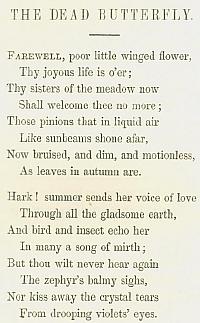Peter John Allan

Peter John Allan was born 6 June 1825 in York, England. He was the third son of Jane (Gibbon) and Dr. Colin Allan, Principal Medical Officer in the army. He moved his family to Canada when he was posted to Halifax, Nova Scotia. Allan’s father retired in 1836, after which his family moved to Fredericton, New Brunswick. Allan attended King’s College for a brief period but left before attaining his degree. He returned to the college to study law; however, he found the experience “dry and uncongenial” (Allan 2). It was around this time in Allan’s life that he began to publish poetry in local newspapers and weekly journals, such as the New Brunswick Reporter and Fredericton Advertiser. James Hogg, the publisher of this paper, was a poet himself and encouraged Allan to continue writing and getting his work published.
Allan was a tall, charming man with dark, sparkling eyes and exceptional manners. Beyond his physical appearances, however, he was a man who appreciated the beauty of nature and life. He enjoyed being outdoors and spent many of his days on long walks, exploring the bounty Fredericton had to offer. Allan was known by many to have a good heart; he showed compassion and generosity to everyone around him. He was influenced by the Romantic poets, especially Lord Byron, to whom he dedicated some of his poetry. The bohemian influence of Byron enabled Allan to break away from the eighteenth-century aesthetic that had been persistent in the poetry scene of Fredericton. In his poem “The Dead Butterfly,” for example, he describes the death of a butterfly so delicately that the reader’s empathy grows out of proportion to the mere insect being described:
Oh! when o'er valley, hill, and grove,
The moonbeams glisten bright,
And all the fairy train come forth,
To dance away the night,
Mayst thou, poor little butterfly,
Among that elfin band,
Sport in the ever-blooming bowers
Of far-off fairy-land. (17-24)
The seemingly inconsequential butterfly is transformed into something much more mystical and beautiful. By focusing on nature and the imagination, Allan sets himself apart from poets, such as Jonathan Odell and James Hogg, whose focus was moralistic and sentimental. In fact, Allan’s poetry influenced poets, like Charles G.D. Roberts and Bliss Carman, who are still read and admired today.
With much encouragement from family and friends, as well as a roster of guaranteed subscribers, Allan sent his manuscript of poems to England for publication. Shortly afterwards, he became ill. He developed a fever and after just two weeks of sickness died on 21 October 1848 at the age of 23. His untimely death came as a shock to many but it had been eerily presaged in his work, which had a preoccupation with death. He had also made arrangements for an early death by proposing to his brother that in the event of his passing, a biography be written in his honour. It was his wish that when reading his poetry, people would remember him as well. Honouring his wish, J. M’Grigor Allan wrote a biography of his brother, publishing it along with Allan’s book of poems in the summer of 1853.
Allan’s sudden illness and death were tragic because he was just beginning to establish a name for his poetry in Fredericton and there was a growing demand for his work. It is clear that he had the talent to become a great poet. When his work was published, a review in the London Morning Post stated that it was “gentle, humane to the heart’s core; singularly sweet, elegant, and tender, and informed with a pure and lofty feeling” (qtd. in Vincent).
Katelyn Mokler, Winter 2009
St. Thomas University
For more information on Peter John Allan, please visit his entry at the New Brunswick Literature Curriculum in English.
Bibliography of Primary Sources
Allan, Peter John. The Poetical Remains of Peter John Allan, Esq., Late of Fredericton, NB With a Short Biographical Notice. Ed. Henry Christmas. London: Smith Elder & Co., 1853.
Bibliography of Secondary Sources
Gair, Reavely, ed. A Literary and Linguistic History of New Brunswick. Fredericton, NB: Fiddlehead & Goose Lane Editions, 1985.
Maxwell, Lilian M. Beckwith. The River St. John and its Poets. Sackville, NB: Tribune, 1947.
Vincent, Thomas B. “Peter John Allan.” Dictionary of Canadian Biography. Vol. 7. Toronto, ON: U of Toronto P, 1988. Dictionary of Canadian Biography Online. 2000. U of Toronto/U Laval. 27 June 2008
<http://www.biographi.ca/en/bio/allan_peter_john_7E.html>.


